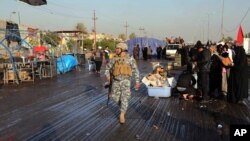BAGHDAD —
Suicide bombings in Iraq killed at least 36 people on Thursday in attacks targeting Shi'ite pilgrims ahead of a major holy day next week, police said.
Two years after U.S. troops withdrew from Iraq, violence is at its highest level since 2006-2007, when strife between Sunnis and Shi'ites killed tens of thousands of people.
The first major attack of the day came when a suicide bomber blew himself up near a funeral tent, killing at least 16 Shi'ite pilgrims and wounding 31 in southern Baghdad's mainly Sunni neighborhood of Doura, police sources said.
A former Reuters reporter, Muhanad Mohammed, and his son were among those killed in the blast, a family member said.
Another bomber set himself off near Latifiya, 40 km (25 miles) south of Baghdad, amid a group of Shi'ite pilgrims of the ethnic Turkmen group who were coming from Kirkuk in the north, killing nine, medics and security sources said.
A third suicide bomb went off in Latifiya, killing another 11 people.
No group immediately claimed responsibility for the attacks, which were the latest in a series targeting Shi'ite civilians and government buildings.
The attacks have killed scores of people just days before Arbaeen, which commemorates the death of the Prophet Mohammad's grandson Hussein, a major figure in Shi'ite Islam.
Many Shi'ite pilgrims are making their way on foot to the holy Shi'ite city of Karbala, south of Baghdad, ahead of the ritual.
Shi'ites are considered apostates by Sunni militants, whose resurgence is blamed by the government partly on the impact of the increasingly sectarian war in neighboring Syria.
In a separate incident, gunmen raided the home of a government-backed Sunni “Sahwa” militia leader in western Baghdad, shooting him dead alongside his wife and two of his children, police said.
The Sahwa militias fought al-Qaida with U.S. troops in Sunni areas from 2006 to 2008, and are viewed as supporters of the Shi'ite-led government of Prime Minister Nuri al-Maliki.





